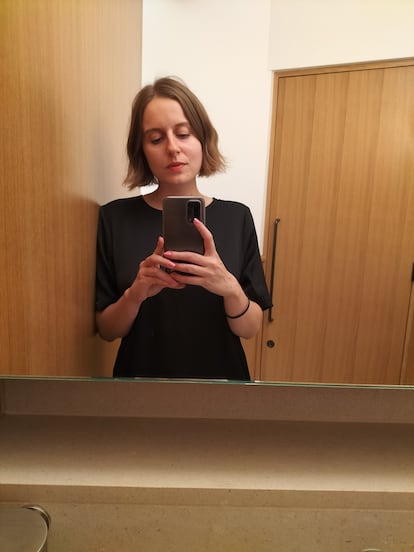‘I am 30 years old and I miss the old internet. The beautiful people are in charge, just like everywhere else’
Journalist Marie Le Conte has published a book in which she nostalgically describes how the online world was better at the turn of the century, without cell phones, social media and influencers

The internet is changing so fast that there are already people in their 30s who look longingly back at the past. In her new book Escape: How a Generation Shaped, Destroyed and Survived the Internet, French-Moroccan journalist Marie Le Conte laments how the internet has changed in the first two decades of the 21st century.
The book offers a kind of cultural history of the web. She compares the internet to a great old bar that grows more and more popular until it becomes unrecognizable. She still goes to that bar, but now sits in a corner, more alone than before.
EL PAÍS spoke via video call with Le Conte, who has lived in London since 2009, where she works as a political journalist. Her life on the internet began centered on blogs about indie music. Social media became an anonymous place to find friends, minor fame and even sex. Today, this has disappeared in favor of algorithms, influencers and more passive consumption. But Le Conte has not fled. The internet is still “my home,” she says. It is no longer an intimate and cozy space, though, but “flat, boring and lifeless.” Before, the internet was not real life. Now it is. In her conversation with EL PAÍS, Le Conte explained some of the most important points of her book.
I have a new book coming out on September 1! It's called Escape, and it's about being part of the first ever generation who got to grow up online, at a point when the internet was new and fresh and ever-changing. https://t.co/l4N8PgYlRX pic.twitter.com/63bsnWPW6c
— Marie Le Conte (@youngvulgarian) June 8, 2022
1. Nostalgia for geek communities
“I’ve identified two periods of the internet,” explains Le Conte. “In my formative years it was very much a place for people who weren’t very attractive in real life: they were very weird, they didn’t have many friends, and their hobbies were weird.” Le Conte includes herself in that list: “We all ended up in that space, because in real life we were not doing well,” she explains.
A microgeneration of people born roughly between 1985 and 1995 experienced that era. They spent their adolescence on the web, which was created in 1989. By their teenage years, it was already a popular place – Amazon, Google and Facebook already existed – but they lived their lives on forums and blogs that they read on their home computers.
In the second decade, everything changed. “The second phase started probably in early 2010. That’s when literally everyone else joined us. All of a sudden, spending all your time online became completely normal,” she recalls.
That’s when the bar was “invaded.” Being on the internet was no longer special. That distinction between digital and real was whittled down to zero: “In early 2020, real life and the internet finally completely merged into one world,” she says. Everything that happens or is said on the internet is now real. It has consequences at work or in private life, and it is linked to your identity forever.
2. The lucky microgeneration
One afternoon in 2007, at the age of 15, Le Conte had a completely “boring” experience of the 20th century. She organized a concert with small bands in her hometown. “What we did was basically piss off my father by printing a lot of brochures on his printer. Then we went to distribute them to the cool parts of the city. At that time, it was still the only way to get the word out,” she recalls.
Le Conte’s lucky microgeneration saw the last breaths of the previous era. They were young enough to use the internet as a controlled laboratory for adolescence. And, they were anonymous: “We had this infinite capacity to reinvent ourselves. Because of the culture at the time, you didn’t use your real name online, but you could also use different pseudonyms on MySpace and on Messenger.”
That anonymity meant that there was a big distance between digital and real life. Nothing crossed over to the other side: “I did a lot of stupid things online when I was young and got into a lot of stupid fights. None of it ever made it to the real world.”
But things changed with the advent of the iPhone. Now, the internet was no longer relegated to the home: “I already had a cell phone and could send text messages. But I didn’t have internet. That, in hindsight, strikes me as the perfect balance. That is a world that I really miss: having almost everything from the internet, but also leaving it behind when I leave the house,” she says.

3. The weirdest porn had frozen trout
The book’s chapter on the discovery of sex and porn is perhaps the one that best illustrates the difference between that early and modern-day internet. At the age of 12, in 2003, Le Conte and a group of friends played a contest to “find the weirdest porn on the internet.” Today, the results of such a search would be unpublishable. At the time, though, they found videos starring a frozen trout, men dressed as pterodactyls (from the waist up) and a rotting sheep’s head (Le Conte won with this one).
Le Conte remembers the discoveries as positive educational experiences. The internet helped her discover that world, with the help of her mother, who answered any questions she had. It didn’t seem like a terrible influence.
But while writing the book, she changed her mind. She had been suffocated once as a sexual game, without her obvious consent. “The chapter was going to have a positive conclusion, but I looked at the data and saw that I couldn’t pretend that this is good. I am sure that it is not just suffocation. Very extreme events have become common,” she says.
Le Conte also sees a generation gap: “When I was a child, pornography was everywhere, but it was in pop-ups or images or videos that took a million years to download. Whereas if I had been five years younger, suddenly all the porn pages were there. This era of streaming porn was a bigger change than the internet in general, because sex has always been on the internet throughout history. But now it is a question of volume,” she explains.
4. The arrival of the beautiful people
The expansion of porn was just a symptom. Le Conte sees several more steps in the internet’s evolution, such as the boom of Facebook and when Tumblr ceased to be a niche network. Most key, though, was when the bloggers gave way to the influencers. Le Conte has an elaborate theory about this step: “If you were a blogger, you did it because you liked to share your life and make friends online, while influencers want money, success and fame in real life. This shows the change in internet culture: from wanting to write my thoughts and hopefully get some followers, to basically being a failure if the big fashion brands don’t send you thousands of dollars worth of clothes.”
Her most refined hypothesis about when the internet became the real world is “when the beautiful people arrived.” “There are studies that show that attractive people have a more pleasant life. That is in the data. I am not inventing anything,” she assures. In the pre-Instagram internet, they did not exist. “The rise of Instagram marked that change: ‘Oh God, we’re doing it again, we’ve reinvented that beautiful people are popular.’ They are men and women, and they are really beautiful and boring, and it was like the internet became the typical American high school movie.”
5. The algorithm is like my cat
“People 10 years younger have grown up on an internet that I don’t recognize,” writes Le Conte: “I was talking about it with a friend recently and we felt older.”
She uses Twitter, Instagram, Tumblr and most other common applications, but has marked TikTok as her limit. “I don’t like it. I’m never going to have TikTok on my phone because I tried, and I hate that it doesn’t let you search or watch what you want. It is fully algorithm-driven. It’s incredibly frustrating. I am the human. You can suggest things to me, but you can’t dictate what I see,” she says. The most common use of TikTok is not focused on who you follow or on specific preferred topics, but on what the algorithm decides.
Le Conte doesn’t want the TikTok algorithm to decide for her. Instead, in the book, she explains how algorithms that recommend ads or other content have entered her life. As an original reader of blogs, she sees algorithm-driven recommendation engines as an unnecessary, albeit cute, addition. For Le Conte, the algorithm is “like a pet.”
“I am aware that there are people in Silicon Valley who want to control my movements to sell me things, but they are far away and irrelevant,” writes Le Conte. “My algorithm, on the other hand, is small and is here with me. I preferred my life online when I was alone and could decide everything, but they have not given me a choice. Now I have a partner on my travels, and I take it personally when he’s not paying attention to me, which is often.” It’s like her cat, she adds.
6. But the internet is still her only home
Still, Le Conte has not abandoned the internet to focus on the real world. She can’t. It is still her home, less pleasant, but still unique. “I still really enjoy spending basically all my time online, even though my life in the real world has improved. The tension for me is between the fact that the internet is no longer the home it used to be, but at the same time it’s still my home and there’s nowhere I’d rather be.”
“As a space, it’s not as fun and liberating as it used to be. Now it’s shrunk more. It’s flatter. But it is still, I would say, at least for me, something that has a positive impact on my life,” she adds.
Tu suscripción se está usando en otro dispositivo
¿Quieres añadir otro usuario a tu suscripción?
Si continúas leyendo en este dispositivo, no se podrá leer en el otro.
FlechaTu suscripción se está usando en otro dispositivo y solo puedes acceder a EL PAÍS desde un dispositivo a la vez.
Si quieres compartir tu cuenta, cambia tu suscripción a la modalidad Premium, así podrás añadir otro usuario. Cada uno accederá con su propia cuenta de email, lo que os permitirá personalizar vuestra experiencia en EL PAÍS.
¿Tienes una suscripción de empresa? Accede aquí para contratar más cuentas.
En el caso de no saber quién está usando tu cuenta, te recomendamos cambiar tu contraseña aquí.
Si decides continuar compartiendo tu cuenta, este mensaje se mostrará en tu dispositivo y en el de la otra persona que está usando tu cuenta de forma indefinida, afectando a tu experiencia de lectura. Puedes consultar aquí los términos y condiciones de la suscripción digital.









































